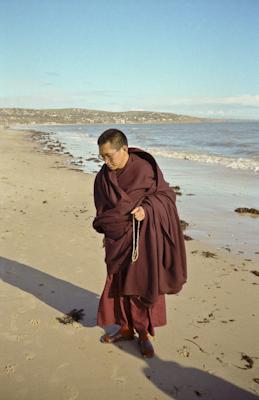The great bodhisattva Shantideva said in the Bodhicaryavatara, “Whatever happiness there is in the world comes from wishing others to be happy. Whatever suffering there is in the world comes from wishing happiness for the self. What need is there to say more? Look at the difference between the child doing work for himself and the mighty ones doing works for others.”
This short quotation explains the shortcomings of the selfish attitude and the advantages of cherishing others. If we cherish ourselves, if we always seek happiness for ourselves, what happens? How has it been so far? What is happening now and what will happen in the future. If we cherish others instead of cherishing ourselves, it is easy to predict what will happen. It is easy to understand. We don’t need to check; we don’t need to use astrology, observations or clairvoyance, or whatever. It is simple. It is the way Guru Shakyamuni Buddha and Shantideva say in the teachings. How has life been so far? From birth until now, how has it been?
I guess you have thought about it many times, so look back at your experiences. The experience of this life has been so much confusion and so many problems. The three poisonous minds and all the disturbing thoughts, like jealousy and pride, have been rising uncontrollably. The mind has always been sick, all the time. Maybe the body wasn’t always sick, but the mind has always been sick with the selfish attitude and the disturbing thoughts.
By understanding the nature of this life, we can see that we don’t have control over the mind, and from this we can guess how our past lives must have been full of suffering. If there was no true cause of suffering; if there was no selfish attitude last year, if those disturbing thoughts had stopped or didn’t exist last year, there is no reason why we should have to experience unhappiness today or this year. There is no reason why we should have to experience suffering or problems. If the cause, the root of the problem, didn’t exist last year, there is no reason why we should experience suffering this year. There is nothing that could make the true cause of suffering come into existence again if it didn’t have a continuation. There is no cause or condition causing the root of the problems to rise. There is no doer or creator of the root of the problems.
If our problems, the true suffering, do not depend on the true cause of suffering; if our problems could arise without a cause, we would experience the result, the suffering, without creating its cause, the karma. In that case, it would be possible to grow plants without a root or a seed. The plant could grow wherever we wish it to grow, without depending on the seed and the root. The plant could grow on the table or in space.
Then it wouldn’t make sense to follow the true path, because suffering would come, whether we follow the true path or not. It wouldn’t make sense to follow the true path, because it wouldn’t depend on the true cause of suffering; it would be independent and self-existent. Those who follow and generate the path would also experience true suffering. Even when they achieve the true cessation of suffering, it would be possible for them to experience suffering.
It is like taking medicine to stop a fever. It stops the fever for a while, but it doesn’t mean that we won’t experience a fever ever again. Practicing the path wouldn’t have great meaning, so even if we achieve the cessation of suffering, it would be temporary, like taking medicine to stop a fever. It is like temporarily stopping a disease.
There wouldn’t be much difference between a person who does not practice Dharma, who does not follow a spiritual path at all, and a person who does. There would not be much difference, because the person who practices and generates the path, and achieves the cessation of suffering, has to experience suffering again. If the problem doesn’t depend on a cause, it is possible for that person to experience suffering again. This is possible if suffering doesn’t depend on its cause, ignorance—clinging to a truly existing I and the disturbing thoughts.
If suffering is not dependent on a cause, we have no choice when it comes. If suffering is independent, when it comes, it comes, and we have to experience it. There is nothing we can do except just experience it; just live with it, go with it. That is the only method left. In that way, it is similar to having a disease.
Take the example of the problem of disease. If the disease doesn’t depend on a true cause of suffering—the ignorance of true existence, clinging to true existence—if the disease is independent, even medicine won’t work. There is no possibility at all of outside conditions, like medicine, making changes to the internal physical conditions, so that the disease or pain becomes less. If disease is independent of causes and conditions, this can’t happen.
Following the spiritual path or practicing the true path in order to achieve the complete, everlasting release from samsara doesn’t have any special meaning if we still suffer in samsara even after accomplishing the true path. The true cause of suffering would come back again.































